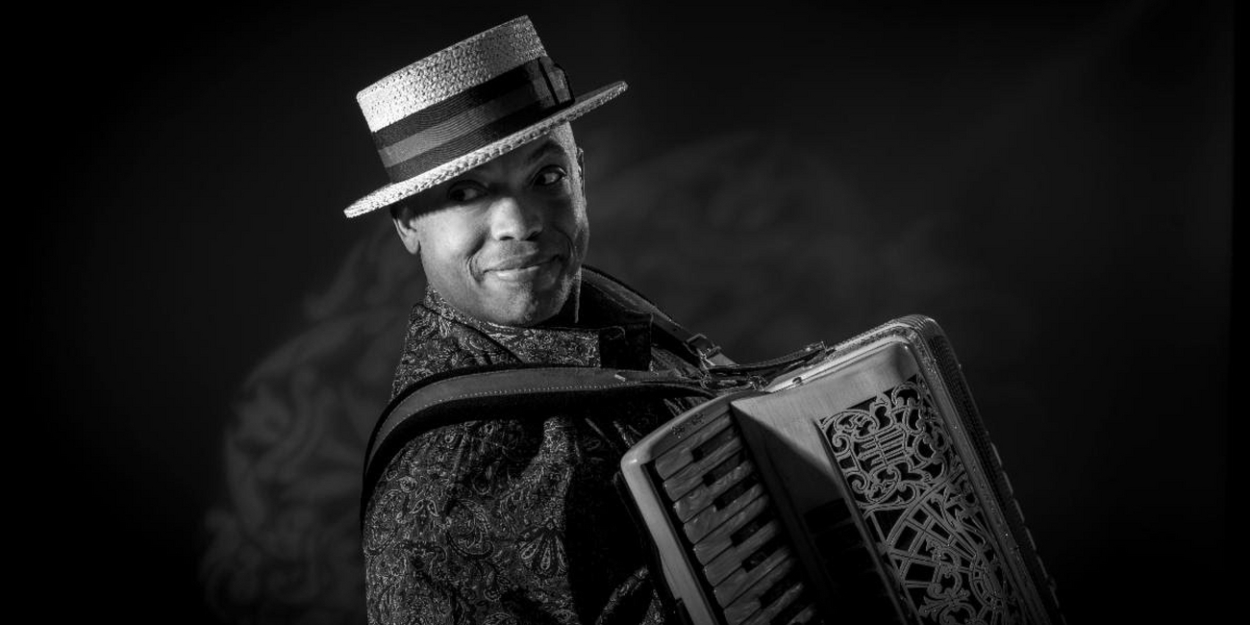Zydeco Star Corey Ledet Releasing New Album Written in Kouri-Vini Creole Dialect
The album will be released on CD, digital download and via streaming platforms on August 25.

Corey Ledet Zydeco's Médikamen is his first zydeco album he’s written and performed completely in Kouri-Vini (Louisiana Creole) in recognition of the journey to reclaim his family’s language.
The album was recorded at Dockside Studios in Maurice, Louisiana, engineered and mixed by Justin Tocket, produced by Corey Ledet and Louis Michot. Special guests include Germaine Jack, Anders Osborne, Kermit Ruffins, and Grant Dermody. Médikamen is being released by Arnaudville, LA’s Nouveau Electric Label on CD, digital download and via streaming platforms on August 25.
Corey Ledet is featured here on accordion and lead vocals, accompanied by: Lee Allen Zeno on bass and backing vocals; Lucien “Big Lou” Hayes on-rhythm guitar; Julian Primeaux on rhythm and lead guitar; Cecil Green on Hammond B3 organ and Fender Rhodes piano; and Je’an-Paul Jolivette on drums, harmony and backing vocals.
Ledet always studied a broad range of different musical genres owing to the love for all music deep in his soul. When he started to research his family’s genealogical roots, he found out that their musical roots dated back to late 1800s. They performed in a variety of the outfits that played Ragtime, early Jazz, Be-Bop, Zydeco, Creole and Blues[1] (some of his people are listed at the end of this release). Learning this brought Corey a deep connection with his ancestors; and he realized that his interest in such a wide variety of music had hallowed precedent.
Corey Ledet was born and raised in Houston, Texas, and spent his Summers with relatives in small-town Parks, where he was exposed to their Kouri-Veni language and Creole traditions. This molded and shaped Corey’s world in a profound way. This culture has its roots in Louisiana, but eventually spread across the country, including into neighboring Texas. When he returned home after summer, Corey was able to remain immersed in the Creole culture he learned to love.
Corey had this to say about Médikamen:
“If I’m making art, it’s a different aspect of creation than just making a record. Definitely something I can be proud of no matter the outcome. After 20 years, I finally feel like I found my identity and am comfortable with this leg of the journey. I’m able to play what I’d like to on various accordions, though through learning the Kouri-Vini language and creating art using it, I feel whole. Reclaiming the language and making this music are two ways in which I take part in our Creole culture.
“Collaboration definitely opened up possibilities for this album to have fellow Creoles’ perspectives when writing narratives and song, including mô kouzin, Herbert Wiltz. On this journey to learning my heritage language, it was a blast to have three different Kouri-Vini speakers on the recording (Ledet, Mayers, Zeno).
It was also cool to hear and learn various variations of the language. Finding out Lee Allen spoke Creole while creating this album reassured me that my first full album completely written in Kouri-Vini was certainly the best step forward.
“Back in the day there was farm life where folks raised chickens, cows, hogs... grew cotton, cane, corn, but they had the language. As time went on, this way of life was diminished by industry, cars, and Americanization. I feel that in Louisiana and in the Louisiana Creole Diaspora, we have or can find most things that makes us Creole: the cuisine, the music, the way of life… I just feel the only ingredient that’s missing in my and the younger generations is the language, which gives us our identity. Ça fé, ça isit çé in kado pou tou nouzòt (So, this is a gift for all of us).”
This project was funded in part by ArtSpark, a collaboration of Lafayette Economic Development Authority and Acadiana Center for the Arts, and was supported by a National Performance Network (NPN) Take Notice Fund, with funding from the Ford Foundation’s Creativity and Free Expression program. More information here.
Comments
Videos

